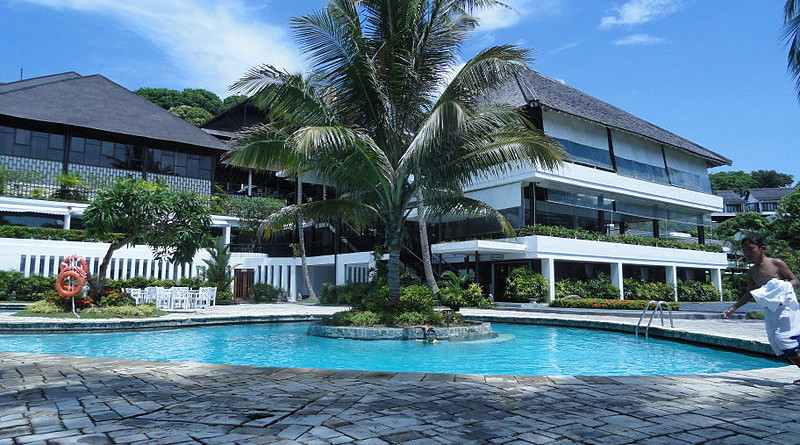Bad Patch For Batam’s Economy – Analysis
By RSIS
The economy of Batam Island, one of the most favoured tourist destinations for Singaporeans, has deteriorated significantly due to the COVID-19 pandemic. What are the implications and how has the local government managed the situation?
By Dedi Dinarto, Adri Wanto, and Leonard C. Sebastian*
The COVID-19 pandemic outbreak in Indonesia has entered an alarming stage due to a spike in the number of positive cases. More than 1,000 cases have been reported throughout the country with Jakarta bearing the largest cluster with the total of cases around 600. The national government has now declared the COVID-19 pandemic outbreak a ‘national disaster’ and established a task force for accelerating the management of COVID-19 as well as calling citizens to avoid public crowds and work place.
Batam, 45 minutes by ferry to Singapore’s south, has also reported three positive cases of COVID-19, raising the number of cases in the Riau Islands Province to a total of 12 cases. One victim died last week, on 23 March 2020. The relatively small number of cases notwithstanding, the island’s economy has been pummelled mercilessly over the last three months, leaving the manufacturing and tourism sectors to suffer significant losses.
Batam’s Tourism Going Downhill
Batam’s Central Bureau of Statistics (Badan Pusat Statistik) recorded that the island has set a remarkable record of attracting foreign tourists in 2019. The island welcomed almost two million tourists last year with more than half that figure comprising tourists from Singapore. Compared to 2018, the island witnessed a 3.2% increase in the number of tourists; an equivalent of more than 60,000 tourists.
However, the COVID-19 outbreak has battered Batam’s tourism industry due to decreased foreign tourist arrivals. Travel restrictions Singapore imposed on foreign travellers are expected to lead to a plunge in the number of foreign tourists from China, South Korea, and Taiwan who usually visit Batam via ferry from Singapore. The closure of two direct flights from China to Batam has also reduced the number of foreign tourists from the Chinese mainland.
Due to the policies being implemented, the Bank Indonesia (BI) Representative in the Riau Islands Province estimated Batam to lose more than US$1 million per month from the tourism sector. Supporting sectors for tourism like hotels, restaurants, and retail outlets have been impacted greatly with the average hotel occupancy rate dropping 40 percent and hotel management requiring their employees to take unpaid leave.
Industries Come to a Standstill
The COVID-19 outbreak has also impacted the development of the manufacturing and industrial sectors of the island. Many factories in Batam have been forced to halt production due to supply chain uncertainty and the availability issues of raw materials from China.
Although Singapore is Batam’s main trading partner, majority of industries rely on raw materials from China including electronic components, plastics and industrial dye material with the total import value worth $1.1 billion in 2019.
Despite growing anxiety palpable among industries, there is latent hope that industrial activity could resume because China may have turned the corner in its containment of COVID-19. The Association of Industrial Estates (Himpunan Kawasan Industri or HKI) in Batam estimates that shipments of raw materials to Batam are expected to return to normal levels by the end of March 2020.
However, whether the shortage of raw material will be alleviated remains to be seen because there is no certainty that shipments of goods from China may reach its maximum potential.
Local Government’s Responses
The Batam Manpower Office (Dinas Ketenagakerjaan) had imposed virus-mitigating measures on foreign workers to control the spread. From a total of more than 4,000 foreign workers in Batam, a quarter of the number are foreign workers from mainland China.
Returning foreign workers from mainland China and other countries are required to undergo 14-day quarantine and restrictions for overseas travel are also in place. Moreover, residence permits for foreign workers have been extended to prevent overstaying.
To overcome the negative impact of the pandemic, the Batam City government had also issued tax rebates to companies to tide them over during hard times and avoid unnecessary layoffs related to the coronavirus.
In addition, the Bank Indonesia Representative in the Riau Islands Province had pioneered a regional grant programme to support the tourism sector as well as to offer a soft landing for businesses affected by the pandemic via the reduction in hotel tax rates and restaurant taxes.
Now What?
The case of Batam is not unlike the situation at the global level. Despite the responsive approach adopted by local government, the structure of Batam’s underpinning economic sectors has raised the threat of unemployment due to the complete shutdown of the ailing industries.
The dependence on raw materials from one source, in this case mainland China, should be a lesson for industrial players on the need to diversify their imports. When the COVID-19 crisis subsides, the local government and entrepreneurs will need to figure out how best to develop a resilient global supply chain system for Batam’s economic sustainability.
Another measure would be a temporary lockdown due to the potency of the contagion given the geographical position of Batam as an enclave island. This policy should be meant only to limit cross-border movements of people rather than affecting the distribution networks of goods and supplies.
The local government, in this case, should work with neighbouring countries and the central government to ensure the continuity of supply of goods and services for those who are locked down on the island.
*Dedi Dinarto, Adri Wanto, and Leonard C. Sebastian are respectively Research Analyst, Research Associate and Coordinator of the Indonesia Programme, S. Rajaratnam School of International Studies (RSIS), Nanyang Technological University (NTU), Singapore. This is part of a series.

